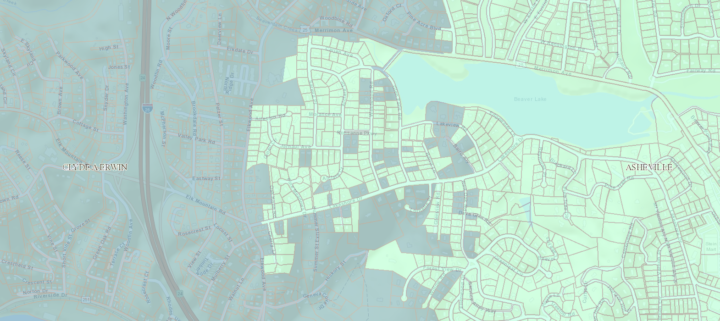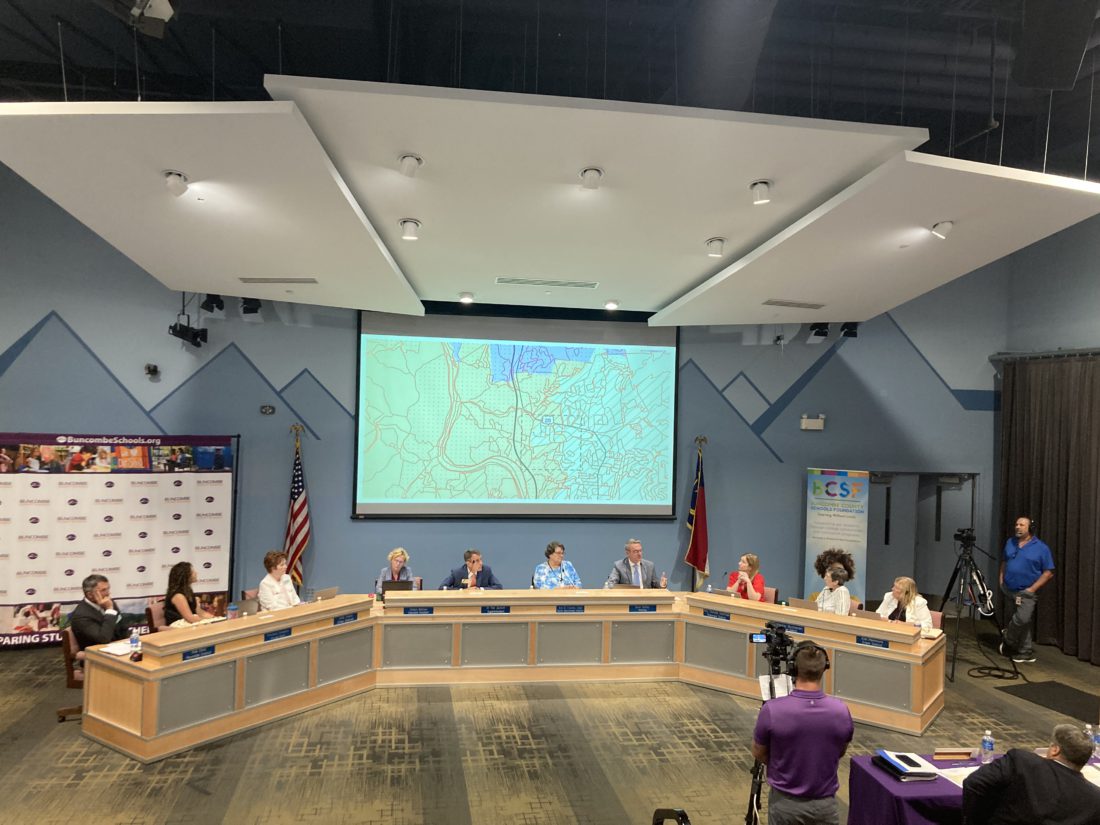The N.C. legislature is requiring the Buncombe County Board of Education to do the impossible, board attorney Dean Shatley said at its Aug. 3 meeting.
House Bill 66, which was passed into law June 7, requires Buncombe County Schools to redraw its electoral districts based on population rather than traditional attendance zones, as the district has done since 1975.
But as Shatley told the board, it is impossible to determine specific populations of certain neighborhoods because of the unique way neighboring Asheville City Schools’ lines are drawn, especially in the North Asheville and Woodfin areas. The ACS and BCS districts intermingle within about 70 different census blocks, creating several islands of populations zoned for one district inside the other, he said.
Since the district can’t determine where people live within each census block, they can’t determine how to draw lines to create equally populated districts among those who live within just the BCS district, excluding ACS-zoned residents.

“They have given us a task that is fundamentally impossible. So really, until something changes, just to be clear to the community, there’s not even anything we can do,” said board member Amanda Simpkins. “Our community and our board have been completely cut out of the conversation. (Legislators have) put their own backs against the wall and given us a task that’s not even possible.”
Early versions of HB 66 only involved school districts in Catawba County. Sen. Warren Daniel, who represents McDowell, parts of Burke and the eastern part of Buncombe counties, added the Buncombe language May 31, one week before the bill passed.
Currently, Buncombe elects one school board member to represent each of the county’s six attendance zones — Enka, Erwin, Owen, North Buncombe, Reynolds and Roberson — and one at-large member. Candidates must live in the district they represent and run on a nonpartisan basis. Meanwhile, residents can vote for all school board representatives, regardless of their address.
Shatley pointed out two other reasons the bill’s demands aren’t feasible.
The law calls for the new districts to be contiguous, which isn’t possible with the current district lines. Plus, the law specifies that only 2020 census data be used to create the new districts. Shatley insisted new data would be required due to the unique lines, with potential surveys necessary on the edges of the district. Such actions, he noted, would be expensive to carry out.
It’s unclear how the district would pay to redraw lines, but Shatley said it would likely be far more than the $25,000 he estimated in June, before he realized the complexity of what the bill required.
“It’s one more layer of cost, and we really don’t have the money,” Simpkins said. “Because they wanted to slide it in at the last minute, they’ve made it impossible.”
Shatley said one potential fix floated during a meeting with legislative staff is to redraw the ACS lines along census blocks. That could change what districts families are zoned for and change taxing districts for some property owners, potentially raising taxes for some because of ACS’ special taxing district.
It’s also possible that the Buncombe section of the bill might be repealed, Shatley said.
Changing representation
In addition to logistical and legal issues with the bill, Shatley said changing lines to match population could result in the loss of representation for less-populated attendance zones.
For example, the Owen district would likely have to be redrawn to include parts of East Asheville and Fairview, currently in the Reynolds district. As a result, families who live in Black Mountain could be represented by someone whose child attends schools in the Reynolds district, Shatley said.
Board member Amy Churchill said that’s why she opposed the bill from the beginning.
While no locally elected leaders have voiced support for the bill, other than Daniel, it has been touted by the Buncombe County Republican Party.
GOP Chair Doug Brown wrote a letter to the editor of the Tribune Papers announcing the GOP’s censure of Churchill, a registered Republican, for publicly opposing the bill. (Following the letter’s publication, Churchill accused Brown of assault at a July 24 GOP meeting. For more, see Asheville Watchdog’s “Buncombe GOP chair accused of assault after Republican school board member says he shoved her at town hall.”)
Brown and other supporters say voters should only be able to elect representatives in their own communities, not on the other side of the county, which waters down their accountability. Churchill vehemently disagrees.
“This was a solution to a problem that did not exist,” Churchill said during the meeting. “And now as it’s come to fruition, there’s more and more issues to this law, tacking on more and more funds, and I don’t care where those things come from, whether it comes from our local dollars or from the state, that’s taxpayer dollars. Last time I checked I’m a fiscal conservative. I have a real problem with wasteful spending. And I consider this to be very wasteful.”




We need one School Board. The community’s problem is no one is accountable to make this happen.
how many millions has lawyer Dean Shatley fleeced us for over the years ? ? ? his fees are an outrage for taxpayers to be paying…
And YES, there is NOT one reason for the taxpayers to fund TWO separate government screwl systems but the racist white democrackkk controllers won’t allow it…
Perhaps Warren Daniels’ constituents in the Buncombe County school district should ring him up and ask him why he would shove through this major change without actually speaking to any of the folks who will have to make this happen. Schools are underfunded in NC, teacher pay is scraping bottom, the general assembly has not passed a budget or figured out how to expand Medicaid while thousands are kicked off. Good thing they do have the time to solve big problems like saying gay in school and interfering with women’s health decisions.